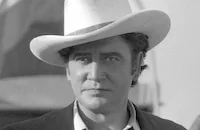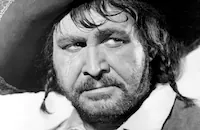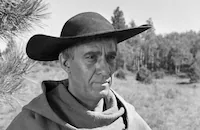Mysterious Intruder

Brief Synopsis
Cast & Crew
William Castle
Richard Dix
Barton Maclane
Nina Vale
Regis Toomey
Helen Mowery
Film Details
Technical Specs

Synopsis
Edward Stillwell, a kindly old music store owner, engages unscrupulous private detective Don Gale to locate Elora Lund, a young girl he has not seen in seven years. Although Stillwell refuses to explain why he wants to contact Elora, he tells Gale that finding her could make the detective a wealthy man. Three days later, a young woman enters Stillwell's shop and introduces herself as Elora. Unaware that Harry Pontos, a thief, is eavesdropping on their conversation, Stillwell informs Elora that he has some of her late mother's possessions which may be of great value. When Stillwell leaves the shop to phone Gale, Pontos sneaks into the cellar and takes a box labeled with Elora's name, thinking that it may contain the valued items. After Stillwell returns, Pontos steals up the stairs, kills the old man and kidnaps Elora. Soon after, Gale arrives and upon finding Stillwell's body, notifies reporters that Elora is an impostor. When Pontos reads the news story about the impostor, he releases his prisoner, whose name is Freda Hanson, a woman hired by Gale to pose as Elora and claim her inheritance. After Freda is freed, Gale visits her at her apartment, but is asked to leave by the building manager, James Summers. With Freda's help, Gale locates Pontos' hideout, but the police arrive just as he is searching the premises. Awakened by the sound of the police pounding at the door, Pontos grabs his gun and starts shooting while Gale slips out the window. After gunning down Pontos, the detectives chase Gale, who loses his shoe during the pursuit. Recognizing Gale, the detectives, Burns and Taggart, proceed to his apartment to interrogate him about Stillwell's murder. When Gale refuses to cooperate, they arrest him. Meanwhile, the real Elora, who was injured in an accident and is recuperating in a sanitarium, sees the newspaper account of Stillwell's murder and notifies the police. Believing that Gale is involved in the murder, Taggart and Burns decide to release him and send Elora to visit him at his office to find out what he knows. After being released from jail, Gale goes to Freda's apartment and accuses her of turning him in to the police so that she could claim the fortune for herself. Before Freda can reveal the nature of Elora's legacy, however, the doorbell rings and Gale hides in the bedroom. There he discovers a newspaper clipping about some rare Jenny Lind recordings and realizes that they must be Stillwell's treasure. When Gale walks back into the living room, Freda is no longer there, so he returns to his office, where he is greeted by Elora. Planning to cheat Elora, Gale holds her incommunicado in a house owned by Rose Denning, one of his operatives. After Summers discovers Freda's strangled body hidden in the closet, the police suspect Gale of the crime. Their suspicions are reinforced when the desk clerk remembers Gale visiting Freda on the night of the killing. Now charged with murder, Gale goes into hiding and decides that he must locate the recordings to exonerate himself. Sneaking into Stillwell's basement, Gale finds Summers there with an accomplice. After admitting that he learned about the recordings from Freda just before killing her, Summers finally discovers the prized wax cylinders. Gale then pulls his gun, and in the ensuing battle, shoots Summers and his accomplice and runs up the stairs. As Gale phones police headquarters to turn over the killers and the recordings, the police, alerted by the sound of gunfire, raid the cellar. Mistaking the police for Summers, Gale blindly fires into the cellar, and the detectives fire back, killing him and shattering the fragile cylinders.

Director

William Castle
Cast

Richard Dix

Barton Maclane
Nina Vale

Regis Toomey
Helen Mowery

Mike Mazurki
Pamela Blake

Charles Lane
Paul Burns
Kathleen Howard
Harlan Briggs
Edith Evanson
Dan Stowell
Donald Kerr
Charles Jordan
Harry Strang
Jack Carrington

Martin Garralaga
Joseph Palma
Isabel Withers
Selmer Jackson
Arthur Space
Stanley Blystone
Kernan Cripps
Jessie Arnold
Crew
Mischa Bakaleinikoff
Juanita L. Bell
Dwight Caldwell
Rudolph C. Flothow
James M. Goss
Wilbur Hatch
Jack Haynes
Carl Hiecke
Robert Priestley
Hans Radon
Philip Tannura
Eric Taylor
J. S. Westmoreland
Edwin Wetzel

Film Details
Technical Specs

Articles
Mysterious Intruder -
As the movie begins, the Whistler informs us that Edward Stillwell (Paul Burns), an elderly music shop owner, is about to have his life go from the mundane to the intriguing. Stillwell shows up at the office of detective Don Gale (Richard Dix) and informs him he's looking for a missing person, Elora Lund (Pamela Blake). There's just one catch: She's been missing for seven years, ever since her mother died when Elora was only 14 years old. There's one other thing, too: Stillwell alludes to the fact that Elora is now rich, though she doesn't know it and Stillwell won't tell Gale how he knows it. Gale, who seems seedy from the start, is desperate to find out exactly how Elora is now wealthy and hires an actress named Freda Hanson (Helen Mowery) to pose as Elora and find out about the money. He figures Stillwell won't recognize the 21 year old Elora from the 14 year old Elora and he's right. Unfortunately for everyone concerned, before Stillwell can tell Elora about her newfound wealth, he's murdered and Gale's a suspect.
Directing the action is William Castle, veteran of four Whistler movies (there were eight total and this was his last behind the camera), who learned the skill of getting short, assembly line product in the can quickly and efficiently under the guiding hand of Columbia Picture head Harry Cohn. This tight, suspenseful entry is not only Castle's best of the series but arguably the best of the series by any director, period. Castle would later become famous for his showmanship as he employed one gimmick after another to promote his movies (The Tingler [1959], vibrating seats, House on Haunted Hill [1959], flying skeleton over the audience, 13 Ghosts [1960], special glasses to see the ghosts) but he also worked with many great stars and directors, including Rita Hayworth, Paulette Goddard, Orson Welles, Vincent Price, and Joan Crawford. Another great to add to that list was the star of seven out of the eight Whistlers, Richard Dix.
Richard Dix began acting in movies in the teens and, unlike many other silent stars, strode confidently into the sound era, his imposing build and rich voice making it an easy transition. In 1931, he starred in and was nominated for Best Actor for the Best Picture winning Cimarron, the epic about settling the west adapted from the best-selling novel by Edna Ferber. Dix worked well in that role but he soon found himself getting lower budget offers as his tough grimace worked against the kind of Hollywood leading man look that audiences loved. The Whistler movies were the perfect vehicle for him because the story changed each time, allowing him to play a wide variety of characters from movie to movie. His best role comes here, as Don Gale, a private eye so ethically slippery the toughest gumshoes in the movies look like angels compared to him. At one point in the movie, his secretary tells him she likes the real Elora and doesn't want him to shake her down. He asks, incredulously, "When have I ever stolen from a client?" to which she responds, "Any time you've seen the opportunity." And yet Dix's Gale is no simple, black and white shakedown artist. He even tries to do the right thing by the end but falters at a crucial point. It's a credit to Dix that he brought so much to characters written with very little background or motivation and intended only to advance the plot and make room for the next installment.
The Whistler series is a good one, not only packing in a lot to each hour installment but often outdoing the more expensive feature noirs released on the A bill. And of the series, The Mysterious Intruder is easily one of the best.
Producers: Rudolph C. Flothow
Director: William Castle
Writer: Eric Taylor
Cinematography: Philip Tannura
Film Editing: Dwight Caldwell
Art Direction: Hans Radon
Cast: Richard Dix (Don Gale), Barton MacLane (Detective Taggart), Nina Vale (Joan Hill - Gale's Secretary), Regis Toomey (James Summers), Helen Mowery (Freda Hanson), Mike Mazurki (Harry Pontos), Pamela Blake (Elora Lund), Charles Lane (Detective Burns), Paul E. Burns (Edward Stillwell), Otto Forrest (The Voice of the Whistler)
By Greg Ferrara

Mysterious Intruder -
Quotes
Trivia
Notes
The working title of this film was Murder Is Unpredictable. As in the other pictures in the "Whistler" series, the film opens with the shadowy figure of "The Whistler," who whistles a haunting tune and then declares, "I am the Whistler, I know many strange tales." The voice of the Whistler also closes the story, revealing the fate of the protagonist. According to a December 1945 Hollywood Reporter news item, newcomer Helen Inkster was intially slated to appear as the female lead. For further information about the series, please consult the Series Index and for The Whistler.














